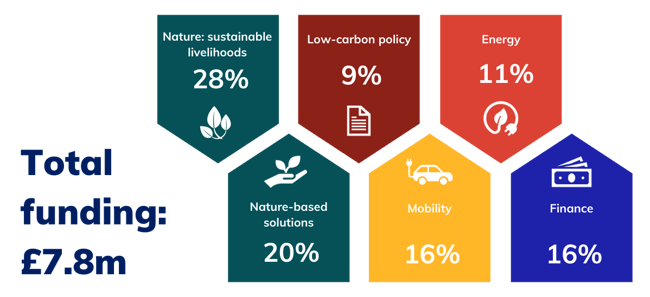UK PACT is partnering with Colombia, a country with a strong commitment to international and domestic action on climate change and sustainable growth.
Colombia and the UK are close allies in addressing climate change. Through the “Partnership for Sustainable Growth”, the two countries are working together to accelerate emissions reductions and drive climate action in line with the goals of the Paris Agreement. Both countries came forward with ambitious commitments at COP26 and will continue to work closely in the coming years to make these commitments a reality.
The Colombia-UK PACT programme has funded over 34 projects to date as well as over 30 complementary expert deployments, which are already delivering real world change to support sustainable growth and emissions reductions. In Colombia, the programme is focused on supporting a Just Rural Transition, a Just Energy Transition and Green Finance as means to supporting climate action.
Learn what UK PACT implementing partners are doing to step up action in these areas:
Our projects are delivering climate action across these priority areas for Colombia:

Led by: Federación Nacional de Cafeteros
Led by: Transforma
Led by: Climate Bonds Initiative
Led by: Fundación Ideas para la Paz
Led by: Stockholm Environment Institute (SEI)
Led by: Swisscontact
Led by: CIAT
Led by: Corporación GANSO Servicios Técnicos
Led by: Rainforest Alliance
Led by: Fundación Solidaridad Latinoamericana
Led by: Global Green Growth Institute
Led by: RARE
Led by: WWF Colombia
Led by: Instituto Amazónico de Investigaciones científicas (SINCHI)
Led by: Awake Travel
Led by: Fundación GAIA Amazonas
Led by: Climate Bonds Initiative
Led by: Centro Regional de Finanzas Sostenibles de la Universidad de los Andes
Led by: Global Green Growth Institute
Led by: Carbon Trust
Led by: ARUP
Led by: Probogotá
Led by: World Resources Institute
Led by: FINDETER
Led by: Universidad de los Andes, Bogotá
UK PACT (Partnering for Accelerated Climate Transitions) is a unique capacity-building programme. Jointly governed and funded by the UK Government’s Foreign, Commonwealth and Development Office (FCDO) and the Department for Energy Security and Net Zero (DESNZ) through the UK's International Climate Finance, it works in partnership with countries with high emissions reduction potential to support them to implement and increase their ambitions for tackling climate change.
© Copyright 2025 UK PACT Privacy Notice Cookie Policy